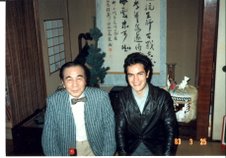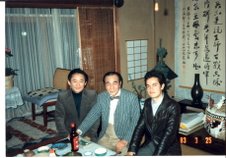End of an era
End of an era
On Friday 6 September 2019 I tendered my resignation, bringing to an end nearly twenty-five years’ work at Newcastle University, first as lecturer in what was then called the Music Department, then as senior lecturer, and then as professor in the by now renamed International Centre for Music Studies. The resignation was accepted.
A quarter of a century’s worth of work could fill a book if recounted in detail, but that would be a book few would want to read. Suffice it to say that I worked and, for much of the time, I overworked. One does not leave senior employment to go on to discuss institutional matters in a blog, so I only offer here some personal recollections by way of valediction.
Periods of particular frenzy were two: the early years when, as a youngish sapper, I ran admissions, the Hopkins Studios and the music technology front, as well as my own discipline of composition and a contribution to the pool of general music teaching. The other especially frenzied time was my three-and-a-half years as Head of Music. These were dramatic in more than one way. The rest of the time was challenging, but not titanically so.
The number of students I taught in all these years would be hard to estimate. There were brilliant ones, there were average ones, there were those who struggled and there were a few difficult ones. It would be invidious to single any individuals out, but I will allow myself to mention groups. The Year Two in what was the only available music programme (BA) the year of my arrival, (1995-6) was a colourful collection of interesting individuals with whom I developed a special rapport. They welcomed me with warmth and humour. I still have occasional contact with some of them. As was not uncommon before tuition fees were imposed, there was a fair smattering of mature students in the group, and they were among the more interesting personalities.
Over the years, there were two or three absolutely outstanding composition students to whom I owe many hours of delight reading through their work and discussing it with them as I followed their progress. I hope that they will continue to do justice to their potential and, if they remain in England, I hope that today’s harsh realities will not succeed in snuffing out their talent.
There were students on the Folk Degree who filled the air with music-making of a high calibre; I remember a number of them with admiration.
As to my colleagues, what can I say. I learned an awful lot from them. The most important and influential one of them I must not name. As the majority of staff in my time, I remain in awe of Richard Middleton. He transformed the place with his intellect and drive. Within the folk area, Alistair Anderson showed a similar single-mindedness and transformative power. I did not always see eye-to-eye with either of them, but admire their dedication I certainly did. Other than them, to mention only the veterans from my time, I admired the flair and formidable linguistic ability of Ian Biddle, the intellectual capacity of David Clarke, the decency and rectitude of Eric Cross, the musicianship and passion of Bennett Hogg, the rigour and productivity of Goffredo Plastino, the exquisite wit of Magnus Williamson. Inevitably over a long period interpersonal relationships fluctuate; much of the time we each got on with our own thing, leaving each other alone. But I do owe each of these colleagues, and some of the others, moments of fond warmth and inspiring conversations, seminars and meetings. There were difficult moments with one or two of them, but that is not what I take away with me.
Being a sucker for grand old architecture, I enjoyed the Armstrong Building and having an office overlooking the quad. The King’s Hall was the venue for numerous concerts I enjoyed as a listener and for other events I instigated, or played in, or conducted. A particularly fond memory is conducting the University Orchestra in one of its better ever line-ups in two programmes of mostly Russian music, including Rachmaninov’s Third Piano Concerto with the excellent Robert Markham as soloist. My A Northumbrian Anthem, written for the new Aubertin organ, was to be my most intimate engagement with this space, as well as a homage to the most important adult in my life, but the piece was never performed.
In my last two years I worked with enthusiasm to set up the interdisciplinary Eastern European and Russian Research Group (EERRG). This gave me the opportunity to interact with colleagues from other disciplines, including some brilliant minds and wonderful people such as Robert Dale, Joanne Sayner, Valentina Feklyunina and others. This also gave me the opportunity to deepen pre-existing professional relationships with much liked and much admired personalities Marina Frolova-Walker, Valentina Sandu Dediu and Adrian Pop. I had ambitious plans for this group and I am sad to have had to leave it in its infancy, but I am pleased to see signs that it is still up and running. I wish it much success.
Over these near-twenty-five years I was far from infallible, but, on the scale of fallibility, I know that I was not among the problem cases. If that is anything to go by, my inbox, now out of my reach, contains many expressions of satisfaction or gratitude and few indications of concern. That was also my experience in the daily interaction with colleagues and students.
This self-obituary would not be complete if I failed to mention that, on my arrival in 1995, the Music Department was a small unit, still recovering from a recent attempt to close it down, having performed unremarkably at the recent research-assessment exercise. During my time it grew in size and in performance, raising its standards, becoming one of the most successful music departments in the country, being selected as a Centre for Excellence in Teaching and Learning and achieving some of the highest research-assessment results in the Kingdom. It would be ludicrous for me to claim any special credit for that, but that I was an active participant in this growth and this success nobody can truthfully deny.
There is any number of ways I might have imagined my time at Newcastle University to come to an end, but not the way it happened. I was loyal to a fault and conscientious with my work at the expense of my personal life and my creative career. Countless small hours and weekend hours that should by rights been family time were spent marking, preparing or doing pressing admin. Colleagues were always respectful, as I was to them. Aside from the customary grumblings from a negligible number of dissatisfied souls, I enjoyed cordial and productive relationships with the students. I will not try to justify the institution’s handling of my case. As far as I am concerned, I was put in an untenable position by facing three processes at the same time, one within the University and two outside. Their progress was uncannily synchronised, with milestone institutional meetings and hearings almost always coinciding in the same week as the external ones. When, near the end of my tether, I saw written evidence that the make-or-break hearing was strongly predetermined against me, and that to fight that predetermination would take more strength and finance than I could muster, I had to accept that it was time to resign. I know that I will question this decision over the years to come, but, writing these lines still reasonably soon after the events, I hope the view that this was the most sensible course of action will stand up to retrospective scrutiny. In today’s view, other, thornier problems would need to be cleared before I attempt to straighten out unresolved issues with Newcastle University.



